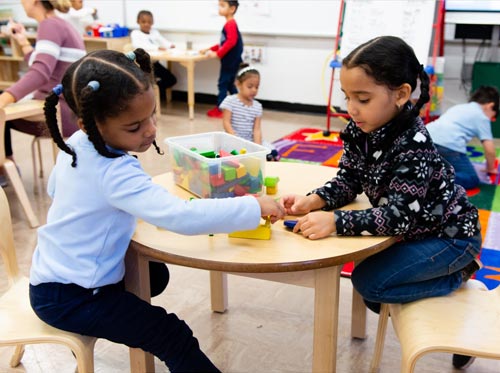
Too often, young people experience a sense of isolation at school because building relationships is not prioritized. In these environments, learners and adults work together in the same space, but often without knowing one another deeply. This is perpetuated by teaching and learning approaches that prioritize independent work and competition over group work and collaboration. In addition, discipline practices—such as detentions, suspensions, and expulsions—exclude learners from the community as a punishment. In order to prepare all young people to thrive in and transform the world, our schools must be relationship-rich and value authentic connection. All learners must be deeply known and respected by a variety of adults and peers; collaborate closely; and form meaningful relationships across lines of difference that nurture empathy, foster belonging, support well-being, and build social capital.

Developmentally supportive relationships and a sense of belonging can flourish in environments that prioritize connection and community for all learners. This can increase learners’ cognitive outcomes and academic performance, buffer against stress and trauma, boost engagement, and contribute to positive emotions and mindsets. It also helps young people see value in the experiences they have at school, provides a critical scaffold that makes learning more manageable, creates opportunities for discussion and higher-order meaning making, and allows learners to give and receive feedback from one another. Learning environments that prioritize connection and a sense of community also build skills and mindsets—such as social skills, hope, and healthy habits—that are critical for learners’ overall well-being now and in the future. These skills and mindsets enable learners to thrive in a diverse, globally connected society and an ever-shifting employment landscape, where building and maintaining personal relationships is essential.
This Leap Means…
- Learners engaging in activities that foster collaboration and reliance on one another.
- Learners feeling a sense of safety and belonging that enables deep engagement in learning and risk taking.
- Learners building new relationships with peers and adults that expand their social networks and capital.
- Learners deeply listening to, learning about, and supporting one another.
- Learners working with others in the school community to grow and heal after difficult situations.
We cannot seek achievement for ourselves and forget about progress and prosperity for our community…Our ambitions must be broad enough to include the aspirations and needs of others, for their sakes and for our own.
Cesar Chavez
Examples
BARR from the BARR Center (Grades K–12)
Building Assets, Reducing Risks (BARR) is a strengths-based approach that leverages strong relationships and data-driven decisions to boost achievement for all learners. Cohort-based learning and I/U (integrated SEL) time—key components of the model—focus on cultivating community in the classroom through strong learner-to-learner, staff-to-staff, and learner-to-staff relationships, while expanding the focus of learners’ in-class experience beyond academics.

Compass from Valor Collegiate Academy (Grades K–12)
The Compass model fosters holistic and adaptive development—including key physical, cognitive, emotional, and spiritual disciplines—through a focus on community and relationships as well as individual identity work. As learners engage in the Compass Phase System and Circle, the community comes together to support themselves and each other, supporting identity development and growth across the Compass Habits and Disciplines.

Embark Education (Grades 6–8)
The Embark Education model supports learners to courageously inquire about, engage with, and discover a sense of self in an environment that is learner-centered, integrated, and embedded in real-world contexts. Through competency-based learning, integrated shop projects, learner-centered conferences, and community reflection time, young people experience a relationship-rich environment where adults support them daily in managing their time and learning.

The Gentlemen’s League (Grades 3–12)
The Gentlemen’s League is an all-male mentorship program that creates opportunities for boys of color to have positive, joyful, affirming experiences that lead to lives of achievement. Through positive and supportive relationships with their mentors, workshops, service learning, field trips, and more, learners find a sense of belonging with peers and adults who share similar lived experiences within the same local community contexts, positively impacting their development.


